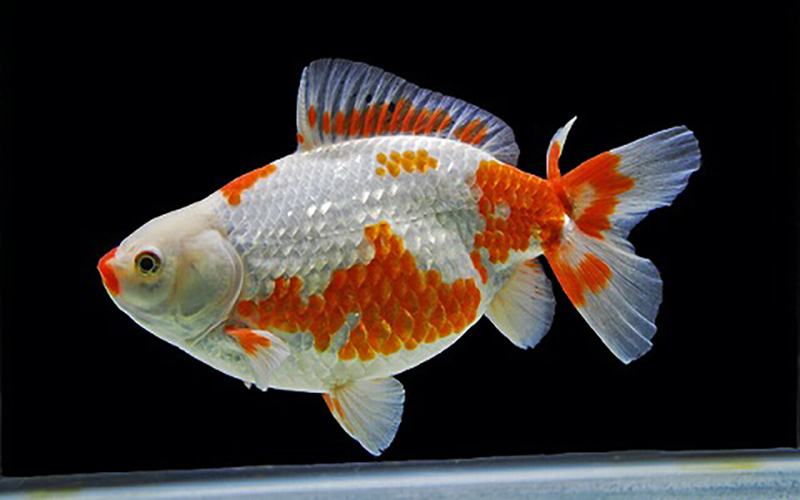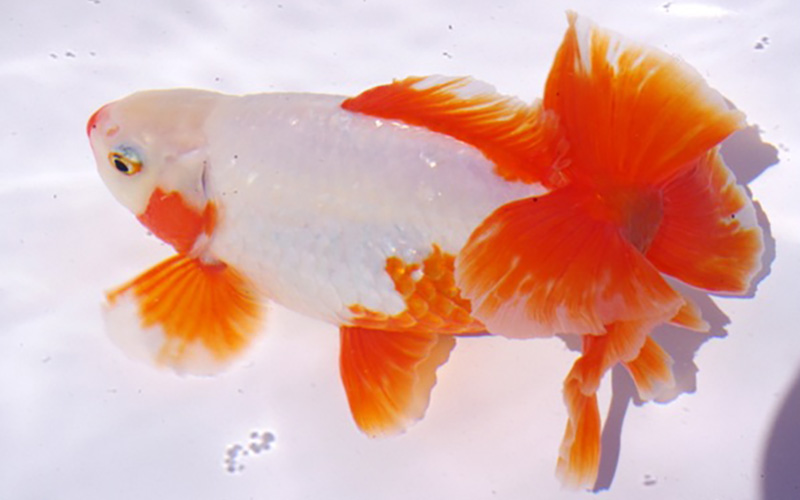ecology
Table of Contents

Bullion is,This goldfish has long been bred and preserved mainly in Nagoya and other areas. The jikin is designated as a natural treasure of Aichi Prefecture. The distinctive feature of the jikin is that its tail fin is shaped like a peacock with its tail spread out.And jikin have so many different names that no other goldfish has. Some of these include jichi-oh, jikin-yoku, shachi, aishiki, ai nishiki, kokaku, and rokurin. The name "shachi" comes from the fact that the tail fin of the jikin resembles the golden shachihoko of Nagoya Castle, which is affectionately called a shachi.
Jikin was culled and sorted in the early Edo period (1603-1867) when a mutation of Wagane caused fish with erected caudal fins to emerge.It is said that Suomori Amano, a samurai of the Owari domain, immobilized the goldfish that suddenly appeared. The goldfish has a split tail fin that resembles the shape of a shachihoko's tail fin, and has since been carefully bred and preserved in the Nagoya area. Because of its rarity and history, it was designated a natural monument of Aichi Prefecture in 1958. There are several species of goldfish called jikin. The short and tall species bred in the Mikawa region of Aichi Prefecture are called jikin. The longer species bred around the Mikawa region in Aichi Prefecture is called jikin, and the shorter and taller species is called rokurin. There is little difference between Jikin and Rokurin in terms of the environment in which they are kept and the way in which they are kept.

The way to enjoy the bullion is the peacock in the tail fin and the body color called six scales.The peacock is characterized by a distinctive tail fin that is split in two when viewed from above. The six scales is a special body color in which only the tips of the mouth, gill covers, and each fin are red.To best appreciate the characteristics of bullion, it is better to view it from above in a bowl (top view) rather than from the side (side view) in an aquarium or the like.
When mixing goldfish with other goldfish and other species, there is sometimes uncertainty as to what species is good and what species is not. First,There is no general prohibition against this or that when mixing goldfish with other species.Therefore, depending on the personality and environment of the goldfish you keep, even species that are said to be bad for each other may get along well with each other. However, there is also the matter of compatibility between goldfish. If you put incompatible goldfish together, there is a high possibility that they will fight or that only one of them will monopolize the food. However, as explained in the first section, there is no prohibition for goldfish, so if you want to mix them, you may do so. Now, we will explain the goldfish that are compatible with bullion and those that are not.
Goldfish that are most compatible with jikin are Ryukin-type goldfish such as Ryukin and Demekin.Jikin itself is a Japanese goldfish of the Japanese goldfish type, but it is not a good swimmer compared to other Japanese goldfish and its constitution is not as strong as other Japanese goldfish, so it is more compatible with Ryukin-type goldfish.
Goldfish that are incompatible with jikin are Japanese goldfish, such as wakin (Japanese goldfish) and comets, which are of the Japanese goldfish type.Many types of Japanese goldfish are agile and grow large in a short period of time. The jikin is also a Japanese goldfish, but its speed of growth and agility are not as good as other Japanese goldfish. If you mix jikin goldfish with other Japanese goldfish, you should be careful because the other goldfish may eat their food, and the size difference between the two goldfish may increase.

Compared to other Wagane-type goldfish, the Jikin is constitutionally weaker and is not a good swimmer. It can be said that it is the most difficult goldfish to handle among the Wagane type goldfish.It is not recommended for hobbyists or those who want to keep a variety of goldfish in a mixed aquarium, because the peacock tail, the most distinctive feature of jikin goldfish, should not be kept in a place with strong water flow to prevent it from collapsing, and obstacles in the aquarium must be eliminated to maintain the six scales that are the body color of jikin goldfish. It is not recommended for those who keep goldfish as a hobby or who want to keep a mixture of goldfish. The Jikin itself is a goldfish that is registered as a natural treasure of Aichi Prefecture, so there are very few opportunities to obtain it compared to other goldfish. Therefore, it is a goldfish that is worth seeing. When keeping a jikin for the first time, we recommend that you always consult with a person familiar with jikin or the staff of a specialty store about the place and environment where you plan to keep it before keeping it.